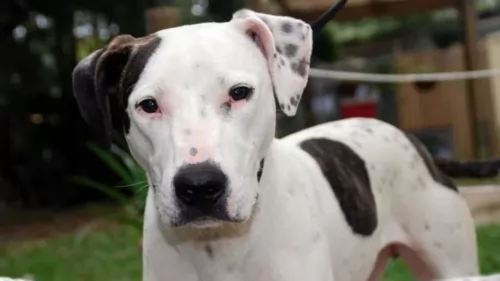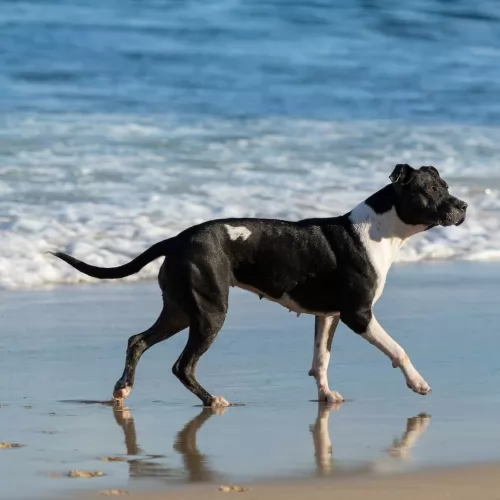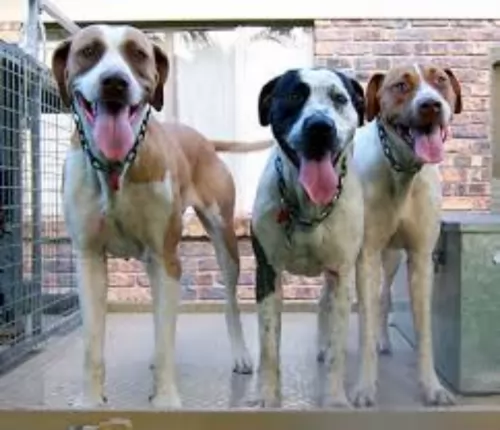 Petzlover
Petzlover Bull Arab is originated from Australia but Hellenic Hound is originated from Greece. Bull Arab may grow 14 cm / 6 inches higher than Hellenic Hound. Bull Arab may weigh 30 kg / 67 pounds more than Hellenic Hound. Bull Arab may live 3 years more than Hellenic Hound. Both Bull Arab and Hellenic Hound has almost same litter size. Both Bull Arab and Hellenic Hound requires Low Maintenance.
Bull Arab is originated from Australia but Hellenic Hound is originated from Greece. Bull Arab may grow 14 cm / 6 inches higher than Hellenic Hound. Bull Arab may weigh 30 kg / 67 pounds more than Hellenic Hound. Bull Arab may live 3 years more than Hellenic Hound. Both Bull Arab and Hellenic Hound has almost same litter size. Both Bull Arab and Hellenic Hound requires Low Maintenance.
 In the 1970’s feral pig hunters wanted a dog that could be aggressive in finding and capturing the pigs. The hunters crossed the German Shorthaired Pointer, the Bull Terrier and the Greyhound to develop the Bull Arab. It is believed that the hybrid is at least 50% Bull Terrier. It is also possible that there is some Doberman, Mastiff, Great Dane and/or Pointer in the hybrid as well.
In the 1970’s feral pig hunters wanted a dog that could be aggressive in finding and capturing the pigs. The hunters crossed the German Shorthaired Pointer, the Bull Terrier and the Greyhound to develop the Bull Arab. It is believed that the hybrid is at least 50% Bull Terrier. It is also possible that there is some Doberman, Mastiff, Great Dane and/or Pointer in the hybrid as well.
The job of the Bull Arab is to hunt out the feral pigs, grab one by the ear and hold it until the hunter arrives. They have a strong sense of smell and that is how they find the pigs.
Mike Hodgens, an Australian, developed the hybrid and added some Bloodhound as well to get that ability to smell out the pigs at great distances. They are also capable of catching buffalo and cattle. Some Australians use the breed in cattle or buffalo ranching. They are registered with the DRA or Dog Registry of America, Inc.
 Developed in Southern Greece, the Hellenic Hound was bred to hunt hare and is an ancient breed. It is a medium sized breed with strong scent and tracking skills. It is believed to have been in existence for thousands of years. The ancestry of the breed included the Lagonikoi or laconikoi, native to southern Greece in ancient times. The breed was spread by sailors on Greece trading ships and colonization.
Developed in Southern Greece, the Hellenic Hound was bred to hunt hare and is an ancient breed. It is a medium sized breed with strong scent and tracking skills. It is believed to have been in existence for thousands of years. The ancestry of the breed included the Lagonikoi or laconikoi, native to southern Greece in ancient times. The breed was spread by sailors on Greece trading ships and colonization.
Todays Hellenic Hound is found throughout Europe. Kept somewhat isolated by the mountains, the breed was protected from outside breeding and they remained pure for centuries. It is a fearless, smart and hyped up purebred. The Hellenic Hound needs to have a job and if you don’t give him one, he will find one. He is smart and independent which sometimes makes him stubborn. It also takes this dog longer to mature than others, sometime between two and three years. It is not good for first time owners. Today’s hound is still a popular hunting dog and companion animal as well. They are rarely seen outside of the Greek country.
In 1996 the Hellenic Hound was recognized as the first Greek dog breed into the FCI. They are not recognized by the AKC. Its numbers continue to decline.
 Mike Hodgens succeeded in developing a powerful, well built dog. The Bull Arab has a powerful head and muzzle. He has moderate length drop ears and bright eyes that match the color of his coat. His chest is neither shallow nor deep and his back is straight and strong. Their tails are tapered and pointed yet the base is thick. They are a double-coated dog. They can be white with black, tan or liver, flecked or bicolor.
Mike Hodgens succeeded in developing a powerful, well built dog. The Bull Arab has a powerful head and muzzle. He has moderate length drop ears and bright eyes that match the color of his coat. His chest is neither shallow nor deep and his back is straight and strong. Their tails are tapered and pointed yet the base is thick. They are a double-coated dog. They can be white with black, tan or liver, flecked or bicolor.
 Today’s Hellenic Hound is not a big dog but rather very average or medium. It is an athletic dog and looks like it. It has a balanced body with a deep chest and thick neck. It has medium height legs that are strong and muscular with paws that are prepared for the terrain it always works on. Its coat is short and tight. The colors of the Hellenic Hound are black with tan or white on the chest. Their heads are noble and rounded with a rectangle shaped muzzle. They have v shaped, long ears and round eyes. Their toe nails are black and so is their nose. It has excellent scent glands, very quick responses, speed and stamina. Their tail is thick and tapers off.
Today’s Hellenic Hound is not a big dog but rather very average or medium. It is an athletic dog and looks like it. It has a balanced body with a deep chest and thick neck. It has medium height legs that are strong and muscular with paws that are prepared for the terrain it always works on. Its coat is short and tight. The colors of the Hellenic Hound are black with tan or white on the chest. Their heads are noble and rounded with a rectangle shaped muzzle. They have v shaped, long ears and round eyes. Their toe nails are black and so is their nose. It has excellent scent glands, very quick responses, speed and stamina. Their tail is thick and tapers off.
 The Bull Arab is intelligent, calm and loyal. Like Pit Bulls in the U.S., the Bull Arab has a reputation for aggression against both people and animals. There is no data to support these claims. They have been used as therapy dogs and companion animals very successfully. They are great with kids and very affectionate. The breed is cited as being used for companion and therapy animals
The Bull Arab is intelligent, calm and loyal. Like Pit Bulls in the U.S., the Bull Arab has a reputation for aggression against both people and animals. There is no data to support these claims. They have been used as therapy dogs and companion animals very successfully. They are great with kids and very affectionate. The breed is cited as being used for companion and therapy animals
 yes, they are very fond of children as long as they are carefully socialized.
yes, they are very fond of children as long as they are carefully socialized.
Great hunter, stamina ,scent, voice
He needs to have a yard or land. He doesn’t do well in apartments.
The breed is very intelligent and can be very trainable. However, they can also be stubborn and that makes training harder.
 The Hellenic Hound is a fairly healthy breed having been isolated on the Island of Greece for the most part. They are susceptible to:
The Hellenic Hound is a fairly healthy breed having been isolated on the Island of Greece for the most part. They are susceptible to:
Could be hips, elbows or knees. If untreated can lead to lameness or inability to walk.
Causes joint pain and can cause lameness or inability to walk.
Can be fatal if not treated immediately. To avoid it don’t feed a large meal before or after exercise.
Can be a variety of things that occur during the hunt.
Need to keep the ears clean and dry in order to avoid infections.
 This is a working dog so he needs to eat the right kind of quality dog food. In order to avoid bloat do not feed large meals but rather feed one to two cups of food two to three times a day.
This is a working dog so he needs to eat the right kind of quality dog food. In order to avoid bloat do not feed large meals but rather feed one to two cups of food two to three times a day.
Hunting Accidents – this is the biggest reasons for health problems with the Bull Arab.
These are working dogs that are inactive when not working. They need a lot of exercise if they are not used for hunting. Agility, Tracking and hunting games, and field trials.
 Feed the puppy 2-3 times a day a total of 2 cups
Feed the puppy 2-3 times a day a total of 2 cups
Feed the adult twice a day a total of 2-3 cups
The Hellenic Hound has excellent stamina, speed and scenting ability.
This is a very active, athletic dog that needs to work and needs exercise. He is powerful, quick and has great endurance. It thrives on hunting but will need other activities on the days it doesn’t hunt. It needs a yard or land to play in. Agility, Field Trials, tracking, hunting and fly ball are all activities the Hellenic Hound will enjoy.